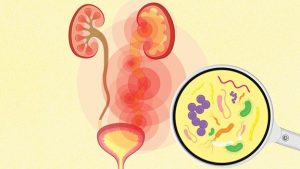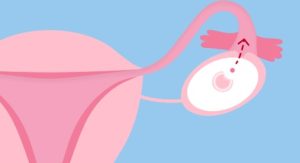Have you ever wondered if the chemicals lurking in your home could affect your fertility?
You might be surprised by the impact of the environment around you. The air you breathe, the water you drink, and the products you use every day can all influence your reproductive health in unexpected ways.
In this blog, we’ll explore some of the biggest threats in your own home and the simple steps you can take to minimize the risks. Your fertility is worth protecting – let’s get started!

Does Your Home Environment Impact Your Fertility?
Trying to conceive? The truth is, that your home environment may be working against you. Various chemicals and pollutants found in homes have been linked to decreased fertility in both women and men.
Your home is full of endocrine disruptors – chemicals that interfere with your hormones. From plastics and nonstick coatings in cookware to flame retardants in furniture and mattresses, these chemicals are nearly impossible to avoid completely. However, there are steps you can take to minimize exposure.
Switch to glass or stainless steel food storage containers instead of plastic. Ditch the nonstick pans and opt for cast iron or ceramic coatings. Vacuum frequently with a HEPA filter to reduce dust, and consider an air purifier.
Pesticides are another concern. If you spray pesticides inside, stop immediately. Even low levels of exposure have been associated with fertility issues. Instead, use natural repellents like essential oils or boric acid powder.
Finally, be wary of toxins from building materials. Choose low- or no-VOC paints and flooring. Make sure any home renovations are well-ventilated. These chemicals are off-gas for years and accumulate in household dust.
The environment in which you live, work and play has a significant impact on your health and fertility. Make your home as non-toxic as possible by reducing chemicals and pollutants. Small changes can have huge benefits when trying to conceive. Creating a clean, green space will support your fertility journey.
The Toxic Chemicals Lurking in Your Home That Could Hurt Your Chances of Conception
Have you ever stopped to think about what’s in the products surrounding you every day? The harsh truth is, that many common household goods contain toxic chemicals that can hurt your fertility.
The Toxic Trio
- Bisphenol A (BPA) is found in plastics like food containers, water bottles, and the linings of cans. Studies show BPA exposure is linked to reduced egg quality and ovarian reserve in women
- Phthalates are plasticizers added to cosmetics, vinyl flooring, detergents, and more. These endocrine disruptors have been associated with irregular menstrual cycles, polycystic ovary syndrome, and lower sperm quality in men
- Volatile organic compounds (VOCs) like formaldehyde and toluene off-gas from furniture, carpeting, cleaning products, and building materials. Long-term exposure to these toxic fumes may lead to fertility issues in both women and men
The effects are scary, but the good news is there are easy swaps you can make. Choose glass or stainless steel over plastic, look for “phthalate-free” labels, and ventilate and avoid heavily scented products. Making your home a haven can go a long way toward protecting your ability to start a family. So, take a look around – what changes will you make today to improve your health and fertility for the future? Every small step counts.
Creating a Fertility-Friendly Home: Small Changes That Make a Big Difference
Have you ever stopped to consider what’s in your home environment and how it might impact your fertility? The toxins and chemicals that surround us daily can wreak havoc on our reproductive health. The good news is, that there are some easy swaps you can make to create a more fertility-friendly space.
Use natural cleaning products
Conventional cleaners contain harsh chemicals like phthalates and parabens that can disrupt your hormones. Switch to natural alternatives with ingredients like baking soda, vinegar, lemon juice, and essential oils. Or look for products labeled “all-natural” and “plant-based.”
Avoid scented candles and air fresheners
Those synthetic fragrances release toxic compounds called volatile organic compounds (VOCs) into the air. Opt for unscented or naturally fragranced soy candles and open your windows to improve ventilation.
Use a water filter
Tap water can contain heavy metals like lead and cadmium, as well as pesticide residue. An under-sink or countertop water filter can remove many of these contaminants. For the best purity, consider an RO or distillation purification system.
Ventilate and dehumidify
Stale air and excess moisture promote the growth of mold and dust mites, which can worsen allergies and respiratory problems. Use an exhaust fan, air purifier, and dehumidifier to improve circulation and filtration in your home.
Choose natural bedding and linens
Harsh dyes, chemicals, and flame retardants found in many conventional bedding products can be absorbed through the skin while you sleep. Look for organic cotton or bamboo sheets, blankets, and mattresses with OEKO-TEX or GOTS certification.
Making these small changes in your living space can have meaningful effects on your health and fertility. Reducing exposure to environmental pollutants and choosing non-toxic alternatives are empowering steps toward building your family. Your home is your sanctuary—make sure it’s supporting your goal to conceive in every way possible!
The truth is, that your environment matters when it comes to your health and fertility. So, take a good look around your home and make some easy swaps to decrease your exposure to harmful chemicals. Clear out the plastic and replace it with glass or stainless steel. Choose natural cleaning products and unscented toiletries. Open the windows and let some fresh air in.
Making small changes can have big benefits for your health and future family plans. You have the power to create a nurturing space for yourself. A healthy home is a happy home, so do yourself a favor and make it a priority. Your body and future babies will thank you for it.







